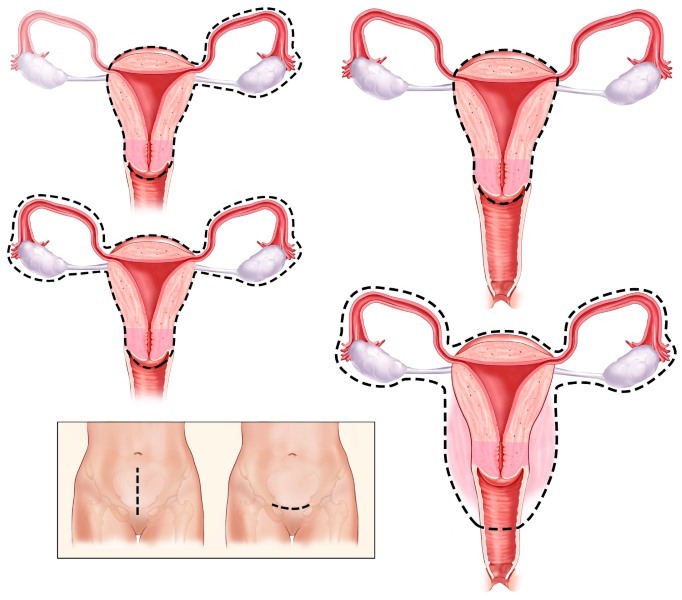As a rule, the indications for the removal of the uterus and ovaries are malignant and cystic formations, bleeding in the abdominal cavity, uterine omission, etc. And the prerequisites for the disease can be previously done abortion, the presence of chronic diseases, some hormonal drugs, etc.
Content
- Removing uterus and ovaries after 50 years
- Consequences after removal of the uterus and ovaries
- Removing uterus without ovaries after 50 years
- Hormones after removal of the uterus and ovaries
- Ovarian cyst after removal of the uterus
- Discharge after removal of the uterus and ovaries
- Ovarian cancer after removing the uterus
- Sex after removal of uterus and ovaries
- Rehabilitation after removal of the uterus and ovaries
- Reviews of women after removing the uterus and ovaries
- Video: a woman's life when they removed the uterus
The operation in which the uterus is removed largely changes the usual lifestyle of a woman, therefore, before making a decision on surgical intervention, it is necessary to carefully study all the information and be examined by several specialists.
Removing uterus and ovaries after 50 years
Depending on the degree of defeat:
- The uterus and ovaries are completely removed.
- Only the uterus is removed.
- The uterus is removed without fallopian pipes.

There are several options for surgery during the removal of the uterus and ovaries:
- Hysterectomy is an ordinary uterine removal operation.
- Laparoscopy - using knives with optical devices.
- Laparotomy is an operation with a large section that opens access to all organs.
- Ovariectomy - ovary (or one ovary) are removed.
- The operation passes through the vagina without leaving scars.
- Combined operation using several methods.
For diagnostics, a gynecologist is examined, the methods of colposcopy and biopsy are used. In addition, a study of vaginal smear and blood test is necessary.
Consequences after removal of the uterus and ovaries
- Any operation is not complete without any consequences. When removing the uterus First of all (even if the ovaries are not affected), we are talking about a decrease in the production of hormones and a further change in the hormonal background. Psychological problems are also inherent in this case, up to the feeling of their own inferiority.
- Among the first consequences showed - discharge of a bloody nature that lasts up to two weeks. Perhaps the appearance of pain that captivating breasts, the pelvic area, the lower abdomen is one of the most common consequences. The reason may be the inflammatory process, it may be affected by the urethra (in this case there are problems with urination), and if tissue infection occurs, the occurrence of peritonitis is not excluded, which can cause problems with the gastrointestinal tract.

- There were also cases of occurrence pulmonary artery thromboembolism. In particularly severe cases, fever, decrease in pressure, the state of tremor are observed. Possible consequences include the appearance of adhesions. If the uterine is removed, and the ovaries continue to work, are not excluded signs of mastopathy, And during the alleged menstrual cycle, joints can be broken, a woman can be irritable or, conversely, drowned.
A changed hormonal background can provoke a set of extra pounds, hair loss.
Removing uterus without ovaries after 50 years
- Removing the uterus despite the fact that one or both ovaries are preserved, according to doctors, leads to a set of symptoms due to changing the hormonal background. Since the uterine arteries are excluded from the blood supply system, the microcirculation of the ovaries is disturbed, and as a result, the development of processes occurs that the production of hormones is interrupted and stop ovulatory function.

- There is no single understanding for today how fast similar processes occur. Some researchers say that already 4 years after removal of the uterus, the hormonal level of a woman of childbearing age becomes similar to what is inherent in women during menopause. Others take about two years to this. This depends on the state of the body, and on the complexity of the operation, and on many other factors.
At the same time, there are studies that claim to reduce the risk of cancer ovarian diseases after removal of the uterus.
Hormones after removal of the uterus and ovaries
- The ovaries develop an estrogen, which essentially makes a woman feminine, playing a key role in the work of reproductive function. After the operation by removal of uterus and ovaries Estrogen either ceases to be produced at all or sharply decreases. Therefore, hormone replacement therapy is needed, because a woman at any age wants to remain a woman.
- The disadvantage of estrogen can lead to cardiovascular, hypertensive diseases, sagging of the skin, excess weight, osteoporosis. At an older age, all these diseases are especially dangerous.

- As a rule, the doctor prescribes hormone therapy after completed recovery period. At this time, the doctor on the basis of examinations may determine whether the body is necessary with an estrogen, or is it also necessary to take testosterone.
- The release of synthetic estrogen is made in various forms: tablets, ointments, injections, etc. Hormonal therapy is prescribed 2 months after the hysterectomy.
Ovarian cyst after removal of the uterus
The cyst is one of the rather frequent consequences after removal of the uterus. It occurs due to reducing the active work of the ovaries. In addition, the reason may be the failure to comply with the therapeutic treatment recommended by the doctor.

- Often in the treatment of a cyst that occurs after uterine removal operations, A conservative option is used using hormonal drugs and vitamin complexes. And only with its ineffectiveness, a cyst is removed using laparoscopy. The hormonal background is normalized with appropriate drugs.
- The risk of cysts after hysterectomy Reduced subject to proper nutrition, exclusion of physical activity. You should also not take a hot bath, and even more so, steam in the bath.
Discharge after removal of the uterus and ovaries
- Like any operation, uterus removal It is accompanied by subsequent bleeding, with possible brown discharge. This is most actively happening on the first day after surgery, as a result of a violation of the integrity of the capillaries, as well as taking bloodless drugs necessary to prevent the formation of blood clots.
- Strong bleeding They may indicate problems with the seam.

- Brown discharge indicates the work of the body for the production of hormones. Distillations of a different nature (with pus or blood clots) may indicate infections, inflammation, suppuration, etc. Such discharge can be observed within a month after surgery.
Doctors do not recommend using hygienic tampons at this time - preference should be given to gaskets.
Ovarian cancer after removing the uterus
- Oncology of the ovary The epithelial nature among women in the postmenopause period, unfortunately, is most common. And in most cases, uterus removal, since the wall can become a metastases area. After surgery, doctors are easier to observe whether the risk of relapse occurs.
In the event that the ovaries are in a precancerous state , uterus removal reduces the risk of the disease. The decision whether to try to save the body or not, only the doctor takes on the basis of the examination, since such preservation of the organ or its part increases the risk of relapse.
- Such an opportunity can be provided farm -age womenwho want to give birth, and only in the early stages of the disease.
Sex after removal of uterus and ovaries
- Sex after removal of the uterus, According to doctors, it is absolutely not excluded and does not become less high -quality. At first, about 2-3 months, of course, will have to refrain, since the woman’s body needs rehabilitation of both physical and psychological.

- About a month after surgery, a consultation with a doctor who conducted the operation is needed for comprehensive examination. And, of course, hormonal drugs are needed that adjust the level of hormones.
- Do not be scared if the orgasm will not always be achieved or it will take more time to achieve it - this is absolutely normal. It is possible to slightly decrease in the level of libido, but absolutely not within those boundaries to interfere with sexual life.
- After the resumption of sexual activity, a feeling of dryness in the vaginal area is not excluded - in this case, special intimate lubricants will help.
Rehabilitation after removal of the uterus and ovaries
- Active life, According to statistics, it resumes a few weeks after surgery to remove the uterus. At this time, doctors do not recommend lifting weights, hypothermia and overheating, also do not take a bath, it is better to limit yourself to a shower. Of course, you have to refrain from sex.
- The diet should be saturated with vegetable and fruit dishes. With some indications, physiotherapy, exercise therapy, acupuncture, massage are prescribed. It will not be superfluous to rest in the sanatorium, especially in the profile of the disease.

- Electron, which helps to reduce violations of the vegetovascular and mental system, can be prescribed.
- If they appear violations in urination, prescribe stimulation modulated currents, and with edema - lymphodrenazh.
- Magnetotherapy It will help restore tissues and improve blood flow. And, of course, drugs play an important role hormone replacement therapy.
Reviews of women after removing the uterus and ovaries
- Irina: I was removed the uterus, since the polyp was discovered, and after its removal, the results of histology were not very good. Therefore, doctors recommended the removal of the uterus. I perked up a little when I saw in the hospital many women who also expected the operation or recovered after it-after all, it’s easier to know that you are not the only one in your trouble. The operation itself took about an hour, and the first day I felt complete powerlessness. But then I had to get up and move so that the adhesions would not appear. Hard, but possible! At first she wore a bandage, walked a lot, followed the spelled diet. With the permission of the doctor, they returned to the intimate life after three months - no problematic issues arose, neither pain nor discomfort. Now, after two years, I live ordinary life. The only thing I have changed is in relation to my health, I regularly pass the examination, which I have not done before.
- Galina:I had almost 70, and 5 years ago I underwent an operation to remove the uterus and ovaries. The indication for her was the presence of a cyst. For surgery, spinal anesthesia was used, since general anesthesia is contraindicated to me due to hypertension. The restoration took about two months, and now the consequences of the operation affect only in certain difficulties with holding urine and feces - you have to immediately go to the toilet at the first calls, since it is hard to endure. But no new diseases, fortunately, appeared.
- Olga: The operation to remove the uterus was done to me, because A large fibroids formed. They prepared for the operation for a long time, brought into line all the test indicators. They removed the uterus to me, without ovaries. The first months, as, probably, everyone had quite complex and unusual - pain, heaviness. But almost two months later, I sincerely rejoiced that I decided on the operation, because I got rid of constant bleeding and frequent running around to the toilet. Six months later, bloody discharge appeared and the doctor found a cyst. But everything worked out: I was removed with granulez that appeared on the seam, and the cyst resolved by itself.






